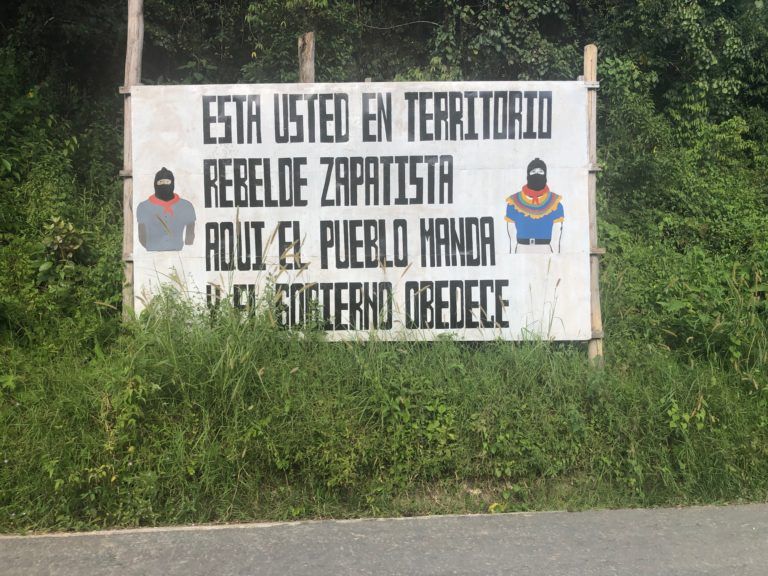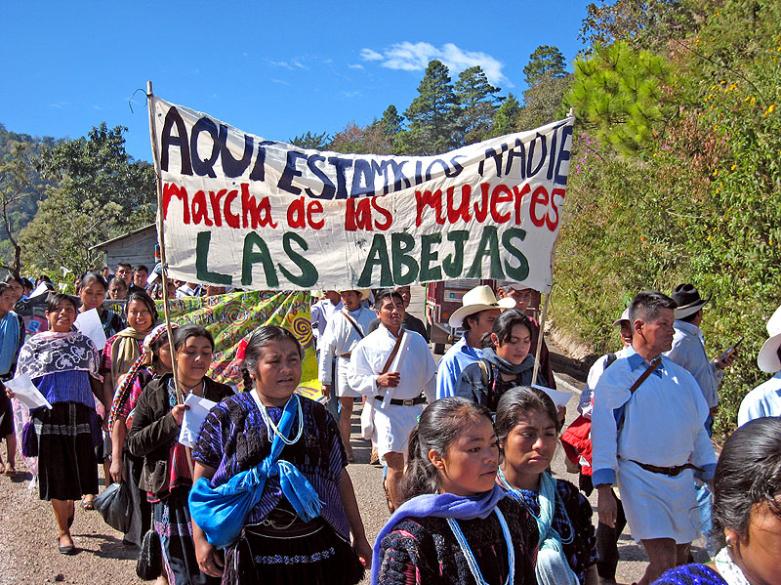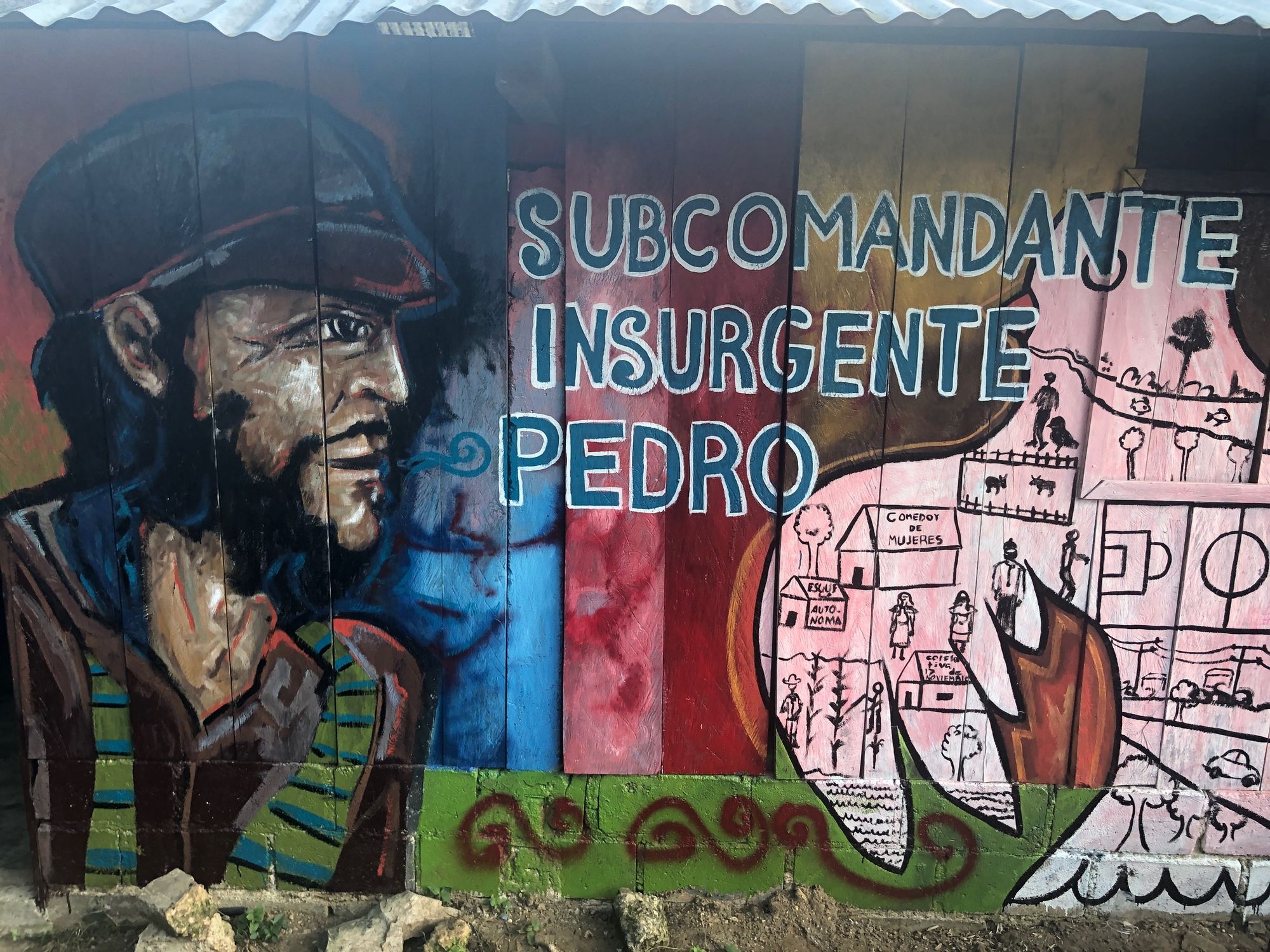This is part two of an essay on Zapatista autonomy that I wrote with a friend and fellow student, which we both wanted to translate into English. In part one, we went over some of the basic history of the Zapatista rebellion, and started exploring the meaning of autonomy. In this post, we argue that their federal and non-dissociative political system, as well as their shared principle of “mandar obedeciendo”, have made a full despecialisation of politics possible.
The political organisation of Zapatista autonomy
The Zapatista political structure is a federal system with three interacting levels: the communities; the communes (or MAREZ), which bring several communities together; and the Caracoles, for the coordination of communes at a regional level. Each level has assemblies and authorities elected for two or three years. The link between these two elements is essential to the functioning of autonomy. For example, decisions can only be taken in consultation with every other assembly/authority level: in fact, there are regularly multiple back-and-forths between the municipal council, the regional assembly, and the communities (Baschet 2021).
Other elements also intervene in the functioning of autonomy, such as the Supervisory Commission of each Zone, or the CCRI, i.e. the EZLN’s Clandestine Indigenous Revolutionary Committee (Baschet 2019). The decentralisation of political organisation and the involvement of ordinary people avoid certain problems inherent to the State and representation, such as the separation between the governors and the governed. The latter leads to the implementation of policies that do not necessarily meet the expectations of the citizens, but only the interests of those in power. In an autonomous system, on the other hand, everyone is able to govern themselves without the State. Therefore, members of the Zapatista community can provide a mandate to others to carry out political tasks, but that direct mandate is essential. There is no self-proclamation, no self-representation in elections, and no political specialists. Zapatista women and men are themselves involved in policymaking, which allows them to respond directly to the interests of their community.
Zapatista autonomy is thus a project of community participation that includes internal participation of citizens in the life of their community, but also external participation of the community in a broader political order (Dumoulin 2010). The Zapatistas interact with the Mexican State through a politics of refusal, and implement forms of engagement at several levels, including a dialogue with national and international political actors (Mora 2017). Here, therefore, participation is not reduced to a political tool that the government uses in the hope of renewing the legitimacy of the existing system. It aims to challenge the mode of political organisation and above all the social order that structures roles and hierarchical positions in all spheres of life, including political activity. Indeed, since the declaration of autonomy, the place of women in politics, but also in Zapatista society, has been positively transformed.
Moreover, autonomy is a constantly evolving process; it is a practice that has the capacity to adapt to social reality (Baschet 2019). It is not a system fixed by theoretical principles that must absolutely be applied to the letter. On the contrary, it is a policy situated in a concrete place, composed of concrete experiences, which must be able to adapt to the context it encounters. This conception opens up the possibility of applying autonomy worldwide (ibid).
'In this sense, the political logic of autonomy is the same as the desire to build a world where there is room for many worlds: not only does it start from the singularity of experiences, but it invites us to recognise that there cannot be a single way of thinking about the exit from capitalism. It therefore calls for the recognition of the multiplicity of worlds, but also for the art of listening, translation and proportionality, so that these worlds are able to coordinate, learn from each other and master their possible divergences. (Baschet 2019, 378)'

According to the Zapatistas, in order to truly realise democracy in the radical sense of popular self-determination, power must be grounded at the grassroots level. That is, society - as opposed to the State, government, or any power-seeking parties and organisations - must be able to control and sanction those in leadership positions, as well as make them respond to popular interests (Chapdelaine 2010). This is what the movement strives to achieve through the politics of autonomy, which allows for the effective participation of all through the idea that the people are capable of organising and governing themselves.
The issue of political competence
From a sociological point of view, political competence is not defined as whether someone is able or unable to take part in politics, because the very idea of competence or legitimacy is socially constructed. In other words, analysing political competence implies identifying the process of social recognition of certain competences, namely whatever is considered necessary to take part in politics. We take up here the conception formulated (among others) by Bourdieu (1979, 465–466), who defines political competence as:
'…the greater or lesser capacity to recognise the political question as political and to treat it as such by responding to it politically, i.e. on the basis of properly political (and not ethical, for example) principles, a capacity which is inseparable from a greater or lesser feeling of being competent in the full sense of the word, i.e. socially recognised as being entitled to deal with political affairs, to give one’s opinion on them or even to change their course.'
From this perspective, the social division of political activity is based on an unequal distribution of these socially-constructed competences, so that the degree of participation and politicisation of individuals is related to their position within the social structure. Their individual socioeconomic characteristics — in particular social class and (formal) level of education — are hence decisive in terms of their chance to acquire these competences, and thus become socially recognised as more ‘legitimate’ for formulating political opinions and intervening in the decisions or construction of public policies.
In the context not only of electoral or parliamentary politics, but also experiments of participatory democracy, proficiency in the ‘language and schemas of politics’ (Lagroye et al. 2012, 351) thus reinforces the participation of members of the middle and upper classes, whose socialisation and formal education led them to internalise the norms, rhetoric, and intellectual references of bourgeois culture. Conversely, the ‘incompetence’ of socially dominated individuals and groups — again, in terms of bourgeois norms, rather than objective inability — manifests itself through their ‘non-participation in “civic” activities’ (p. 348) within the bourgeois public sphere. This highlighting of inequalities in politicisation is therefore a possible way of explaining the low participation of workers and poor people in experiments in participatory democracy.
The particularly interesting dimension of the Zapatista experience is, in this respect, the absence of a specialisation (or professionalisation) of political activities and expertise (in the sense of technical competence). As Lascoumes (2002, 377) explains,
'We can consider that the future of expert practices is linked to their capacity to become more democratic, i.e. to truly open up their approach to contrasting points of view and, in particular, to organise a plural expertise that does not stop at the networks of specialists alone and knows how to make a real place for lay people.'
However, the Zapatistas seem to emphasise the despecialisation of political tasks and public functions. According to Baschet (2019, 362-363),
'The Zapatista experience allows us to insist on the following points: short, non-renewable mandates that can be revoked at any time; the absence of personalization and the collegial exercise of responsibilities; control by other bodies; limited concentration of a capacity to elaborate decisions that remains largely shared with the assemblies; the ethics of the collective and the capacity to listen. Above all, however, it is necessary to insist on the effective despecialisation of political tasks which, instead of being monopolised by a specific group (political class, caste based on money, personalities with particular prestige, etc.), are the object of a circulation that is as generalised as possible: ‘We must all, in our turn, be government’ (maestro Jacobo). As has been said, this implies, among other things, abandoning the idea of linking the choice of delegates to the evaluation of a particular individual competence: assuming that elected authorities do not know more about public affairs than others is the condition — oh so difficult to accept! — of a full despecialisation of politics.'

It is important then, as already mentioned above, not to conceive of the Zapatista mode of organisation as a form of complete or pure horizontalism. According to Baschet, the Zapatistas practise a ‘non-dissociative’ form or modality of delegation, as opposed to configurations of delegation based on a dissociation between the rulers and the ruled. This dissociation characterises, according to him, ‘political representation in the modern state,’ corresponding to ‘the methodical organisation of the effective absence of the represented’ (ibid, 362). He concludes that it is necessary to emphasise the sensitive balance represented by the Zapatista system, between ‘verticality of command’ and ‘horizontality of consensus’ (ibid, 74):
'It is not a question, therefore, of a real power-over that one part of the collective manages to monopolise and exercise over others, nor is it a question of perfect horizontality, which runs the risk of dissolving for lack of initiatives or the capacity to put them into practice. Rather, the observation of the Zapatista experience invites us to recognise the articulation of two principles: on the one hand, the capacity to decide resides essentially in the assemblies, at their different levels; on the other hand, those who assume, in a rotational and revocable manner, a special role of initiative and impetus, as a mediation between the collectivity and its capacity for self-government, which does not go without opening up the twofold risk of a deficiency or excess in the exercise of this role. (ibid, 361)'
This potential risk, due to the existence of positions of authority/leadership, is however limited within Zapatista autonomy by a remarkable sense of collective responsibility: a community ethos of reciprocity, as documented for instance by Mora (2017) in her ethnography of the municipality Diecisiete de Noviembre. More concretely, it is a set of principles contained in the general phrase mandar obedeciendo (‘governing by obeying’). This general political principle, formulated at the outset of the Zapatista rebellion (Chapdelaine 2010, 41), seems to derive from older Indigenous cultural practices in the Tseltal and Tojolabal communities (Mora 2017: 191).
In its most concrete sense, mandar obedeciendo implies that those in authority are accountable to the people and organise what the people have decided in a general assembly: ‘the authorities are responsible for implementing those decisions reached by consensus in the assemblies, rather than taking decisions in the name of the people’ (Mora 2017, p. 191). This is similar to the longstanding principle of imperative mandate that has characterised a range of revolutionary movements or episodes since the 19th century. For instance, in the Paris Commune of 1871, not only representatives, but also people assigned to various public functions (e.g. magistrates and judges), derived their roles from such revocable mandates.
According to Chapdelaine (2010), mandar obedeciendo allows ‘to overcome the professionalisation of politics, which has led to a systematic separation between the governors and the governed and to the loss of meaning of the forms of government.’ (ibid, 41). As Mora brilliantly demonstrates (see chap. 5 of her book), political competence is thus constructed, in the everyday social interactions and cultural practices of the Zapatistas, as explicitly resting on non-specialisation:
'Of the members of the councils of good government, the Zapatistas have been able to say: “They are specialists in nothing, least of all in politics” (SDR). This non-specialisation leads to the admission that the exercise of authority is carried out from a position of non-knowledge. The members of the autonomous councils insist a lot on the initial feeling of being helpless in front of the task that falls to them (‘nobody is an expert in politics and we all have to learn’). But it is immediately emphasised that it is precisely by accepting not knowing that one can be a ‘good authority’, who tries to listen and learn from everyone, who knows how to recognise mistakes and accepts to be guided by the community in making decisions (GA1). In the Zapatista experience, entrusting the tasks of government to those who have no particular capacity to carry them out is the concrete ground from which the mandar obedeciendo can grow; and this is a solid defence against the risk of separation between governors and governed. (Mora 2017, 359)'
It is in this sense that we can understand her assertion that the principle of mandar obedeciendo inverts ‘the logic of command-obedience that we find in classical Westernised political theory’ (ibid, 192). She goes further than other authors by arguing that it is also necessary to look beyond the framework of assemblies to observe ‘how mandar obedeciendo forms part of the politicisation of social life in diverse daily spheres’ (ibid, 228). In her ethnography, she describes, for example, the politicised conversations she observed within the women’s production collectives of Diecisiete de Noviembre. The mandar obedeciendo, in this sense, is (also) related/equivalent to a political and cultural practice that the author calls ‘Kuxlejal politics’ (ibid, 19):
'When I asked Mauricio what the Tseltal word for “life” is, he explained that its rough equivalent is kuxlejal, “life-existence.” Kuxlejal as a term is but a mere point of anchor granted meaning when used as part of the term for the concept of expressing living as a collective, stalel jkuxlejaltik, a way of being in the world as a people, and as part of the term for a daily aspiration to live in a dignified manner, lekil kuxlejal. The horizon of struggle for lekil kuxlejal, with its Tojolabal equivalent, sak’aniltik, as a good way of living refers not only to an individual being but to that being in relation to a communal connection to the earth, to the natural and supernatural world that envelops as well as nurtures social beings and is thus constantly honoured. Without land, without the ability to plant and harvest sufficient food, without the constant remembering of ancestors in connection to the future and as part of revering the earth, the elements that provide sustenant meaning to life dissipate.
When Zapatista community members associate the political practices of autonomy with creating a new life, they refer to lekil kuxlejal, to a life politics understood as involving these interconnected realms. Autonomy as the foundation of life politics thus is expressed in gathering fallen branches for firewood, in harvesting corn in the fields, in praying for abundant water-not too much, nor too little, just what is necessary for the corn and beans to flourish in the fields, in collecting edible leaves in the forest or picking vegetables in the backyard gardens, in taking care of the children and the elderly, in sharing memories of past events so as to produce knowledge effecting changes in the present. It is the sum of activities in such arenas that allows for the dignified reproduction of life, not only as a physical presence but as a series of cultural processes that allow for the perpetuation of kuxlejal in its collective form and as a collective force.'

Conclusion
In summary, for the Zapatistas ‘democracy is something that is built from below and with everyone’ (Chapdelaine 2010, 46). Their revolutionary autonomy has allowed for the total reorganisation of politics and society in parts of Chiapas, directly involving Mexico’s indigenous populations in the construction and implementation of policies and decisions that affect them directly.
The contrast between the respective contexts of the predominantly Indigenous and rural communities of Chiapas and that of the experiments of participatory democracy in (especially more urban) spaces in Europe should not prevent us from reflecting on the issues that run through all these forms of participation. While it is clear that the Zapatista experience is not as such transferable or strictly comparable to other contexts, its radical form of democracy ‘from below’ helps identify the potential limits or obstacles of so-called “participatory democracy” in other contexts. The non-separation between politics and the rest of society, and especially between the governors and the governed, seems to be one of the main aspects that distinguishes it from most other cases.
Among the Zapatistas, the construction of competence and legitimacy to participate lies, in our opinion, in a collective will — inscribed in the struggle for self-determination of the Indigenous populations in Chiapas — to achieve a form of communal democracy based on the non-specialisation of activities and responsibilities, as well as on the defence of one’s own way of life. Baschet (2021) suggests that the core of these Zapatista forms of life lies in the three words: community, land, and territory.
Note: this two-part article was written in the spirit of an open and ongoing discussion about the Zapatista revolution, thus the author invites any feedback or further dialogue about the claims/arguments presented here (including potential criticisms or corrections) and more generally about the Zapatista experience and what we can learn from it.
Special thanks to our current patrons, who make everything we do possible:
Mr Jake P Walker, Aryeh Calvin, Meghan Morales, Kimonoko, Joshua Akapo, Diana Rahim, Chaotic Capybara, Christian Kennedy, Cy.Maggran, Bogdan Ovodiu Gheorghiu, La Val, Paul Treadwell, Alex Paterson, Loke, Ben Dunn, Barry, Nothing, Manic Maverick, Vervain, and Kevin Atkinson.
If you'd like to support out work, please consider becoming a Patron:





